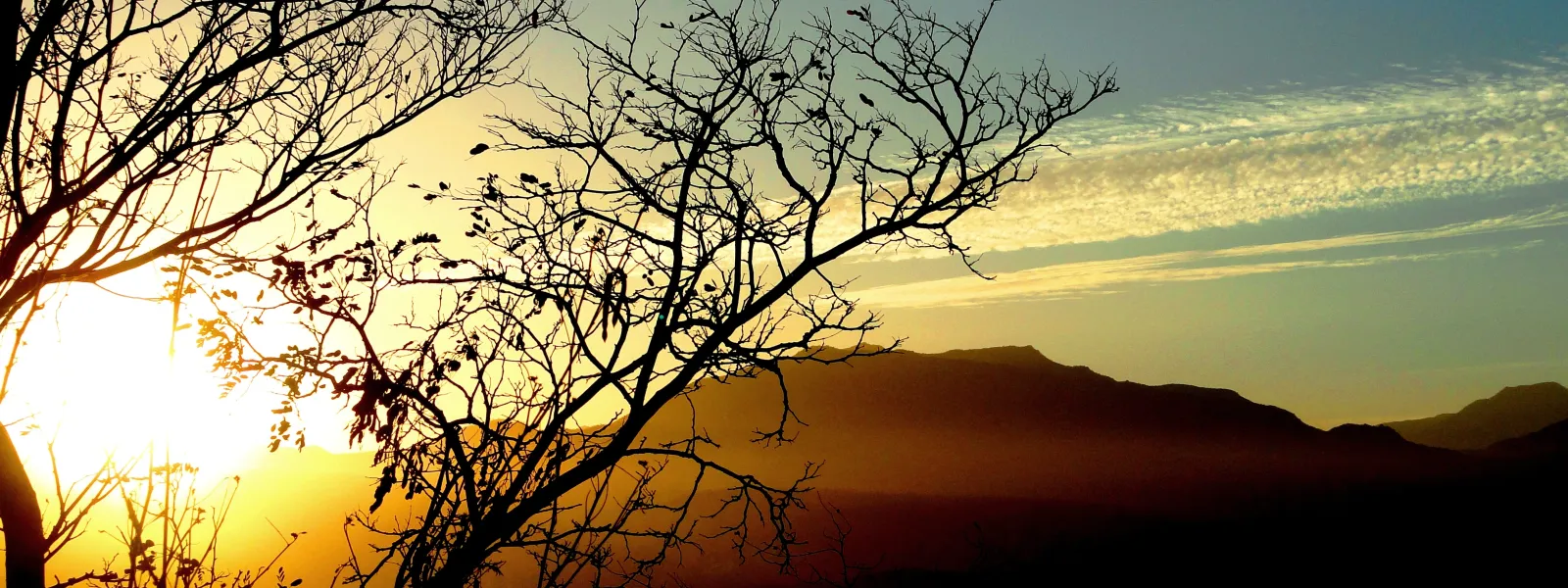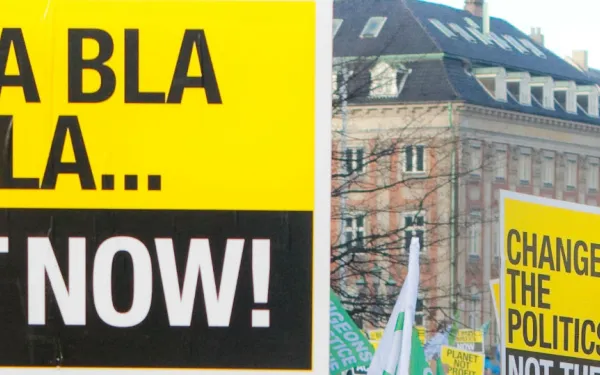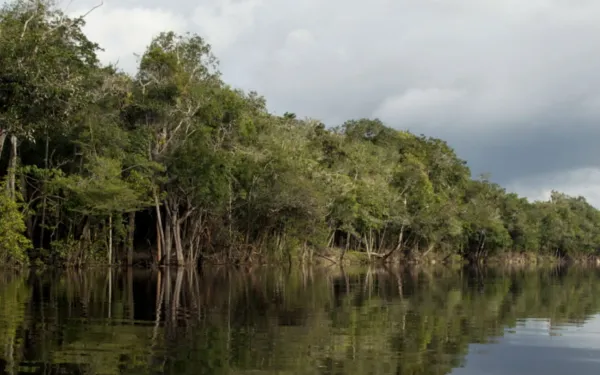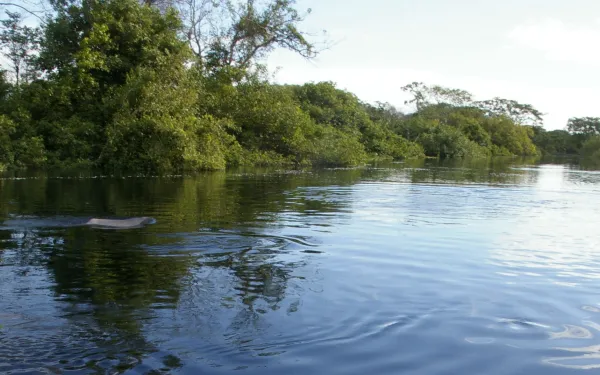
Project
Photo: Ana Rodríguez Carrington (CC BY 2.0)Victory: Biosphere Reserve in Baja California Saved from Toxic Mine
Known as an “ecological treasure house,” the Sierra La Laguna Biosphere Reserve at the southern tip of Baja California will not be spoiled by toxic mine waste, thanks in part to AIDA’s advocacy.
The reserve was once an island, so it’s home to rare plant and animal species. Canyons, swimming holes, and hot springs can be found in its granite mountain range and lowland tropical forests.
Thanks to AIDA and our partners in Mexico, the Mexican government denied an environmental permit for the Paredones Amarillos gold mine, halting the project for the time being. To protect the biosphere reserve, AIDA helped educate community groups and decision makers about the mine's risks. This helped to build the political momentum necessary for the government to deny the permit.
To extract gold from the mountains, the Canadian company Vista Gold proposed to carve out huge quantities of rock—each ton containing a mere gram of gold–-grind it into sludge, and treated it with cyanide. The company planned to dump massive amounts of toxic waste (called “tailings”) behind a dam intended to store it forever. Unfortunately, tailings dams can break for various reasons, as happened at Bolivia’s Porco mine in 1996. When that dam collapsed, more than a quarter million metric tons of tailings flooded the river and contaminated 500 miles (800 km) of waterways in Bolivia, Argentina and Paraguay.
The mine could also cause acid mine drainage. When sulfur-containing rocks are exposed to air and water, sulfuric acid forms, which causes toxic heavy metals to dissolve and drain into the watershed. The risk of acid mine drainage in Sierra La Laguna was significant and the human and environmental cost would have been tremendous: thousands of people and countless wildlife in the reserve rely on its water for survival.
Depleting freshwater is a further threat because mines use tremendous quantities of water. Owing to the scarcity of water in the reserve, Vista Gold proposed to build a plant on the Pacific coast to remove salt from sea water in a highly energy-intensive process, and then pump the water 45 km to the mine site. The desalination plant posed a threat to the endangered leatherback sea turtle.
Singly and together, the mine’s impacts would have devastated a rare jewel, a unique and lush paradise worth saving for future generations.
Related projects

Putting people’s fundamental rights at the core of solutions to the climate emergency
Announcing the First Ever Global Summit on Human Rights and Climate Change The People’s Summit on Climate, Rights and Human Survival – the first ever global summit on human rights and climate change – will be hosted by leading civil society groups and the UN Human Rights Office in New York on 18-19 September. The People’s Summit aims to galvanize the human rights community to urgently scale-up its efforts on climate justice, creating the most diverse movement ever assembled to tackle the climate crisis. The People’s Summit was announced in an open-letter below, which was published on the Thomson Reuters Foundation. The human rights and environmental communities must seek solutions together. It’s time for all of us to come forward as one to face the climate crisis. Our organisations seek a world where people thrive in a safe and healthy environment, where human rights come before corporate profits. To make it happen, we need to face the climate crisis united in the strongest and most diverse movement ever assembled. Only together can we make world leaders take this emergency seriously. Real solutions to the climate breakdown must place people and our fundamental rights at the core. This is an invitation to all those who value human dignity and wellbeing to fully throw their weight behind the call for global climate justice. And to those working to protect our planet to center their efforts in communities, particularly the people most impacted and least responsible for the climate crisis. The human rights community can bring key constituencies, power and skills to the fight for climate justice. The strength of a collective movement to overcome the climate crisis needs to match the gravity of the problem. Our organisations are coming together to make it happen, and we are urging the environmental and human rights communities to join us. To meet the challenge we, the people, must be more connected with each other and more committed to our planet than ever before. This is a matter of survival. Rampant carbon emissions have triggered unprecedented, dangerous and destabilising changes in our climate. Corporate and governmental neglect has already exposed millions to increasingly extreme weather disasters. We must reverse course now; the window of opportunity to act is closing. Make no mistake. The impacts of climate change already hinder our rights to health, food, water, housing, work and even life itself. These impacts are even more severe for people already in vulnerable situations in places impacted by severe weather, poverty or oppression. Our societies cannot keep on like this. People need access to justice, governments must work for the people and corporations need to be accountable for their actions. Now is the time to act. The signs of a shared will to do so are everywhere. Students are taking to the streets to call for a safe future. Indigenous Peoples are speaking up for the defense of land, water and communities’ rights. Workers are demanding safe and well-paying jobs in better, cleaner industries. Women’s rights activists are putting forward a wealth of feminist solutions. Religious leaders are calling on us to protect communities and nature. Scientists are gathering and sharing evidence to guide us out of the crisis. We know the challenge, and the answers are there. Solutions are available now, including renewable energy sources, respect for fundamental rights and traditional knowledge, and a true focus on the needs of the people over corporate greed. All of our organisations work on climate change already, some more explicitly than others. But now is the moment for us to connect the dots between our causes and join forces. A climate emergency is upon us, and we must act now. Environmental human rights defenders, Indigenous Peoples and local activists have long risked everything to fight environmental degradation. They are now joined in their struggle by growing mass movements such as the school climate strikes, Extinction Rebellion and campaigners calling for a Green New Deal. In this new era of climate activism, the human rights community cannot remain on the sidelines. It is more urgent than ever that we step up by working together to protect the communities and individuals on the frontlines of the climate struggle. That is why 150 non-governmental leaders and activists from different communities are coming together on September 18 and 19 for the ‘People’s Summit on Climate, Rights and Human Survival’. Our organisations will be there along with the United Nations Human Rights Office to support people demanding immediate and ambitious climate action from their governments to protect communities. We believe in unleashing the potential of a diverse movement to safeguard present and future generations. We are united to demand climate justice. Confirmed signers: Astrid Puentes, Co-Executive Director, Interamerican Association for Environmental Defense (AIDA) Bridget Burns, Director, Women’s Environment and Development Organization Carroll Muffett, President and CEO, Center for International Environmental Law Chris Grove, Executive Director, ESCR-Net Ellen Dorsey, Executive Director, Wallace Global Fund Gillian Caldwell, CEO, Global Witness Iago Hairon Souza, Coordinator, Engajamundo Jennifer Morgan, International Executive Director, Greenpeace International Kumi Naidoo, Secretary General, Amnesty International May Boeve, Executive Director, 350.org Phil Bloomer, Executive Director, Business & Human Rights Resource Centre Philip Alston, Center for Human Rights and Global Justice Chair, New York University Sharan Burrow, General Secretary, International Trade Union Confederation Sofia Monsalve, Secretary General, FIAN International Steve Trent, Executive Director, Environmental Justice Foundation Thalita Silva e Silva, Coordinator, Engajamundo
Read more
The GCF should thoroughly assess the policies and practices of the BNDES and require conditions for its accreditation
The Board of the Green Climate Fund (GCF) is considering an application for accreditation of the Brazilian National Development Bank (BNDES, Banco Nacional de Desenvolvimento Econômico e Social). The accreditation process of the BNDES is an opportunity to strengthen the Bank’s policies and procedures designed to identify, address and remediate environmental and social impacts linked to its activities and operations. With the new administration of President Jair Bolsonaro, Brazil is suffering severe setbacks in its environmental, social and climate policies and agenda. Brazilian environmental agencies are being dismantled, while renowned and effective mechanisms such as the Amazon Fund are at risk of becoming inoperative or even eliminated. In such a context, the effectiveness of the country’s environmental and social (E&S) governance and its instruments, agencies and institutions, risks being severely undermined. In order to fulfil its mandate to promote a paradigm shift towards low-emission and climate resilient development pathways within the context of sustainable developmentthe GCF should ensure that local systems and institutions are adequately equipped to deliver the sustainability outcomes intended by the Fund. The GCF should carefully assess BNDES’ existing E&S policies and procedures and ensure that approval is conditioned upon commitments and measurable steps by the Bank, with political support from the Brazilian government, to further strengthen its policies and procedures to address following shortcomings related to: Disclosure of environmental and social (E&S) information; Design of E&S policies and monitoring tools; Human rights standards and the rights of indigenous peoples and other traditional communities; Grievance mechanism; Commitments concerning climate change. Read the full statement here
Read more
International tribunal supports indigenous struggle for the Amazon
“The most beautiful jungle in the world,” wrote Alcides D’orbigny, a French biologist, of the Isiboro Sécure Indigenous Territory and National Park (known locally as Tipnis, for its Spanish initials) in the 1830s. Located between the departments of Beni and Cochabamba, Tipnis is a natural protected area that extends over 12,363 square kilometers of Bolivian Amazon. It’s one of the world’s most biodiverse sites and home to many indigenous cultures—among them the Mojeño Trinitarios, the Tsiman and the Turacaré. Despite its recognition as a National Park and Indigenous Territory, the area has for decades been threatened by a proposed highway that would effectively divide it in two. The construction would cause grave social and environmental damages, some of which have already occurred—two of three proposed stretches of road have already been built. As long as the highway has been proposed, the indigenous people of Tipnis have stood strong in their resistence, calling to protect the rainforest and the life it holds. Their efforts paid off last month in a precedent-setting legal victory for the protection of human rights and the environment. The International Rights of Nature Tribunal ruled that the Bolivian State had “violated” the rights of nature and of the indigenous people that inhabit Tipnis by encouraging the highway’s construction. The Tribunal was created in April 2010 at the People’s Conference on Climate Change and the Rights of Mother Earth, when the Universal Declaration of Rights of Mother Earth was also signed. Its role is to establish and investigate any violation of the rights outlined in the Declaration and found in the internal laws of each country. The Tribunal determines whether there was a violation and, if so, who was responsible. It emits recommendations, advisory opinions, and can determine provisional measures. Indigenous defense of the Bolivian Amazon The proposed highway through Tipnis has spurred strong indigenous resistance, and has also caused great suffering. The most painful incident happened in 2011 when more than 100 indigenous people marching on La Paz, headquarters of the Bolivian government, were brutally repressed by police. Despite the conflict, that demonstration achieved the enactment of a law that bestowed the national park the status of “intangible zone” or absolute reserve. Unfortunately, six years later, that law was null and void when the government enacted a new law through more expeditious process. Tipnis indigenous representatives denounced this and other acts before the International Rights of Nature Tribunal, which agreed to consider the case in January 2018, and then sent an international commission of observers to visit the zone and interview stakeholders. Indigenous representatives denounced that, despite being a single roadway, the project was actually presented separately, in three separate phases. Currently, only the final section remains unconstructed. Other irregularities included the awarding of the project to a Brazilian company without first completing an environmental impact assessment, and the lack of adequate consultation with affected indigenous communities. The Tribunal's sentence, issued May 15, finds the Bolivian government responsible for rights violations and calls for immediate compliance with measures including: Definitively stopping of any progress on construction; Recognizing the faculties of indigenous peoples to guarantee their control in Tipnis, including territorial autonomy and the right to prior consultation; Annuling a law that removed the status of intangible zone from Tipnis; Stopping the advance of colonization toward the central zone of the national park; Canceling plans for oil expansion on the site; Effectively applying the law to guarantee the protection of the rights of Mother Earth; and Guaranteeing indigenous peoples their fundamental role as defenders of Mother Earth. What’s next for Tipnis? Although the Tribunal’s judgment is not binding, it is a precedent established by a recognized and ethical court. For this reason, the Coordinator of Indigenous Organizations of the Amazon River Basin—an international indigenous organization—announced it would use the ruling as an instrument of proof to bring the case before the Inter-American Commission on Human Rights. The situation in Tipnis is complex. While construction of the missing section was suspended after losing credit for its execution, some actors continue to defend the road as fundamental to connecting the center and the north of the country, facilitating access to basic services and other development opportunities for the communities of Tipnis. The other side of that argument is the extensive environmental degradation to an area rich in biodiversity—acknowleding that the road would be just the beginning of activities within the protected area. I don’t believe anyone has the absolute answer. And so my analysis isn’t about making a value judgment, but about complying with the law, which resides in reason and justice. Although part of the road is constructed, there is much more to go, and so the resistance continues. The Tribunal’s decision can and should be used as an added impulse toward protecting the land. In the end, every effort is worthwhile knowing that the destruction of such a valuable natural ecosystem represents a point of no return.
Read more